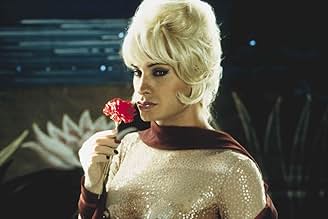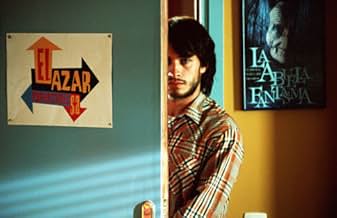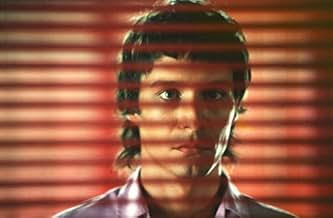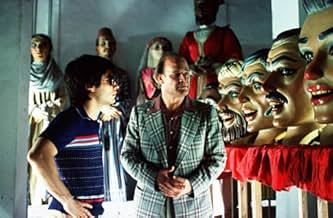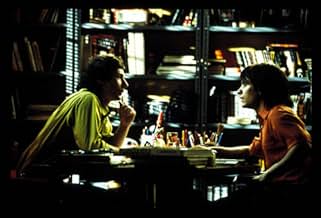CALIFICACIÓN DE IMDb
7.4/10
65 k
TU CALIFICACIÓN
Una mirada a los efectos que tuvieron las escuelas religiosas franquistas y sus abusos sexuales a través de los ojos de dos amigos de infancia.Una mirada a los efectos que tuvieron las escuelas religiosas franquistas y sus abusos sexuales a través de los ojos de dos amigos de infancia.Una mirada a los efectos que tuvieron las escuelas religiosas franquistas y sus abusos sexuales a través de los ojos de dos amigos de infancia.
- Nominada a1 premio BAFTA
- 16 premios ganados y 42 nominaciones en total
Nacho Pérez
- Ignacio
- (as Ignacio Pérez)
Raúl García Forneiro
- Enrique
- (as Raúl Gª Forneiro)
Agustín Almodóvar
- Limpiador Piscina
- (sin créditos)
Pedro Almodóvar
- Limpiador Piscina
- (sin créditos)
Robert Forcadell
- Man in public
- (sin créditos)
Luis Lobos Negros
- Motero ochentero
- (sin créditos)
- Dirección
- Guionista
- Todo el elenco y el equipo
- Producción, taquilla y más en IMDbPro
Opiniones destacadas
With 'La Mala Educación' Pedro Almodóvar has surpassed himself. It's a very intelligent film with wisely-chosen actors. Gael García Bernal is simply magnificent in portraying three very different characters. This goes to show that he's not only got looks but also a great talent. It couldn't have been easy for him, especially when doing the role of Zahara! Fele Martínez is also very good as Enrique, Ignacio's beloved childhood friend. A round of applause goes to the young Ignacio as well. One can see the anxiety in his eyes when Father Manolo approaches him. The latter's frustration is very clearly brought out in the direction of certain scenes by Almodóvar. Definitely not a film to miss!
This is a difficult film to write about. For one thing, to describe the plot would be to give away the twists and thus spoil its surprises; but for another, it's impossible to take a great work of art and put it into words. That said, here goes:
Truth be told, it was the promise of Gael Garcia Bernal (whom I've loved since "Y Tu Mama Tambien") in drag that piqued my interest in seeing "Bad Education." The only other Almodovar movie I'd seen before this was "Talk to Her," which I was on the fence about, but if Gael Garcia Bernal was involved, I was happy to give Almodovar another shot. (Interestingly, "Bad Education" has given me a new appreciation of "Talk to Her." The two films share a lot of themes -- false identity and self-creation, the willful self-deception and fantasy of falling in love, the spiritualization of aesthetic beauty -- not to mention a hypnotic use of music, an indifferent attitude towards women, and a few actors I recognized.)
Almodovar's genius in both "Bad Education" and "Talk to Her" is his ability to set the scene, stringing the audience along, lulling it into a sense of comprehension and security, and then suddenly turning the tables with a twist of such dizzying magnitude that the mind, reeling, forced to give up on trying to understand, must just relax and allow the movie to take over -- miraculously, all without leaving the audience feeling manipulated. In "Bad Education," he takes this device to breathless, upper-atmospherical levels, for with each twist, the film takes on a new genre.
It begins as a tender coming-of-age story, interspersed with boarding-school flashbacks reminiscent of such French fare as Louis Malle's "Au revoir, les enfants" and François Truffaut's "L'argent de pôche," although I sensed a lot of Fellini in the mod outfits, feathery hairstyles, and picturesque bicycle-strewn streets. Probably the most romantic segment of the film, it alludes even to "Breakfast at Tiffany's" (Henry Mancini's "Moon River" hasn't been employed so creatively since last year's "Angels in America"). Indeed, the performances are so endearing, the cinematography so warm and luminous, that this segment of "Bad Education" could easily exist as its own self-contained movie. I was fully prepared to embrace it and love it as a sincere period romance.
But without warning, the film turns itself upside down and becomes an exhilarating meta-commentary in the vein of Charlie Kaufman's "Adaptation" (complete with crocodiles). Romance turns to farce and tragedy to comedy as the self-consciously cinematic style gives way to the silliness of a movie-within-a-movie.
Unlike "Adaptation," though, "Bad Education" goes on, and in this way it retains its heart and soul. Further twists are introduced, and the movie metamorphoses into a mystery, a thriller, a dark rain-soaked noir -- by the end, I felt as though I had just lived through a hundred years of cinema history, all condensed into less than two rich, glorious hours.
So what holds it all together? The answer is Gael Garcia Bernal. He is a true movie star -- divinely beautiful, dazzlingly charismatic, with that all-important aura of mystery -- and though he virtually plays five characters as his character transforms along with the film, his strikingly calm blue-green eyes and sensual mouth provide a steady center for the madness around him. Despite the rumors of his abusive treatment on set at the hands of Almodovar, Garcia Bernal has a dignity (without which "Bad Education" would collapse under the weight of its own intelligence) that no amount of makeup, wigs, dresses, induced anorexia, or fake Spanish lisping can mask.
"Bad Education" was one of the most intense movie-going experiences I've ever had, and if its future doesn't hold critical acclaim and recognition as a classic, then there's no justice in the world.
Truth be told, it was the promise of Gael Garcia Bernal (whom I've loved since "Y Tu Mama Tambien") in drag that piqued my interest in seeing "Bad Education." The only other Almodovar movie I'd seen before this was "Talk to Her," which I was on the fence about, but if Gael Garcia Bernal was involved, I was happy to give Almodovar another shot. (Interestingly, "Bad Education" has given me a new appreciation of "Talk to Her." The two films share a lot of themes -- false identity and self-creation, the willful self-deception and fantasy of falling in love, the spiritualization of aesthetic beauty -- not to mention a hypnotic use of music, an indifferent attitude towards women, and a few actors I recognized.)
Almodovar's genius in both "Bad Education" and "Talk to Her" is his ability to set the scene, stringing the audience along, lulling it into a sense of comprehension and security, and then suddenly turning the tables with a twist of such dizzying magnitude that the mind, reeling, forced to give up on trying to understand, must just relax and allow the movie to take over -- miraculously, all without leaving the audience feeling manipulated. In "Bad Education," he takes this device to breathless, upper-atmospherical levels, for with each twist, the film takes on a new genre.
It begins as a tender coming-of-age story, interspersed with boarding-school flashbacks reminiscent of such French fare as Louis Malle's "Au revoir, les enfants" and François Truffaut's "L'argent de pôche," although I sensed a lot of Fellini in the mod outfits, feathery hairstyles, and picturesque bicycle-strewn streets. Probably the most romantic segment of the film, it alludes even to "Breakfast at Tiffany's" (Henry Mancini's "Moon River" hasn't been employed so creatively since last year's "Angels in America"). Indeed, the performances are so endearing, the cinematography so warm and luminous, that this segment of "Bad Education" could easily exist as its own self-contained movie. I was fully prepared to embrace it and love it as a sincere period romance.
But without warning, the film turns itself upside down and becomes an exhilarating meta-commentary in the vein of Charlie Kaufman's "Adaptation" (complete with crocodiles). Romance turns to farce and tragedy to comedy as the self-consciously cinematic style gives way to the silliness of a movie-within-a-movie.
Unlike "Adaptation," though, "Bad Education" goes on, and in this way it retains its heart and soul. Further twists are introduced, and the movie metamorphoses into a mystery, a thriller, a dark rain-soaked noir -- by the end, I felt as though I had just lived through a hundred years of cinema history, all condensed into less than two rich, glorious hours.
So what holds it all together? The answer is Gael Garcia Bernal. He is a true movie star -- divinely beautiful, dazzlingly charismatic, with that all-important aura of mystery -- and though he virtually plays five characters as his character transforms along with the film, his strikingly calm blue-green eyes and sensual mouth provide a steady center for the madness around him. Despite the rumors of his abusive treatment on set at the hands of Almodovar, Garcia Bernal has a dignity (without which "Bad Education" would collapse under the weight of its own intelligence) that no amount of makeup, wigs, dresses, induced anorexia, or fake Spanish lisping can mask.
"Bad Education" was one of the most intense movie-going experiences I've ever had, and if its future doesn't hold critical acclaim and recognition as a classic, then there's no justice in the world.
Enrique is a film director working on his new project when an old school friend, Ignacio, arrives looking for acting work. Enrique fobs him off with excuses and Ignacio leaves him with a story he has written called 'The Visit'. The story is based on their childhood together as well as having a totally fictional section where Ignacio (Zahara). As Enrique reads the story it takes him back to his childhood effectively where they fell in love as boys before being separated by Father Manolo who also loved Ignacio. When he decides to make the film of the story it only serves to spark more memories as well as bringing revelations.
When I read the plot summary for this film I assumed that it would be difficult to penetrate (pardon the pun) and that I would struggle to follow it. Now that I think back on it I wonder how on earth I managed to follow a film that has threads and characters that don't exist even within the film and it is to the film's credit that it works really well. The film appears to have about three of four stories but really it is only one story that we are being told and a very effective story it is. It is engaging and very well written we care about the characters even as they change and trick us. Only the final 20 minutes appear to be unsure of themselves and it is here that the film drags slightly, but at till this point it is all great. This is not to say it is an easy watch because it isn't.
If you are homophobic then this is not the film for you I am used to seeing shows (Oz, 6 Ft Under) where such acts are portrayed but I was taken aback by the graphic nature of the acts here. I don't mean you see anything but it leaves very little to your imagination. This is not a problem it's just that many men may find this difficult to watch. Likewise scenes involving mutual masturbation between young boys is hardly something that one can watch without feeling slightly uncomfortable. However the one thing the film does through all this is deliver good characters. As much as I couldn't watch Ignacio licking his fingers to wet his 'area' and ease penetrate I still liked him as a character. Even more pleasing was the fact that the film never makes Father Manolo a monster; of course there is no sympathy for the man in the film but it could have just made him a lecherous beast who the audience immediately hate a pantomime villain but the script creates a more complex character.
The cast do a great job of delivering these characters and they make it work very well even if come of them have to change characters midstream or be one of several actors playing the same character. Martínez plays the most consistent character in the film and he does well with a good part, even if he has a less showy role than some others. Bernal has the most difficult role and he does really well to keep the audience with him while delivering all sorts of roles! If nothing else he is a brave actor and he deserves good parts to do more work like this. I don't know the rest of the actors by name but I enjoyed the other queen in the fictional part and also the guy who played Manolo in the fictionalised and childhood sections. Boira's Ignacio lacks subtlety and is overblown but by his point of the film I think that was the whole point.
Overall this is far from most people's cup of tea even those used to seeing art films may find it hard going due to the graphic simulation of the sexual acts within the film. But despite this the film is really well delivered. Many Almodóvar fans have said this is one of his lesser films but I cannot agree when I think of the skill he displays in keeping the difficult narrative together. The characters are mostly well written and the story is engaging even if it flags a little bit at the end.
When I read the plot summary for this film I assumed that it would be difficult to penetrate (pardon the pun) and that I would struggle to follow it. Now that I think back on it I wonder how on earth I managed to follow a film that has threads and characters that don't exist even within the film and it is to the film's credit that it works really well. The film appears to have about three of four stories but really it is only one story that we are being told and a very effective story it is. It is engaging and very well written we care about the characters even as they change and trick us. Only the final 20 minutes appear to be unsure of themselves and it is here that the film drags slightly, but at till this point it is all great. This is not to say it is an easy watch because it isn't.
If you are homophobic then this is not the film for you I am used to seeing shows (Oz, 6 Ft Under) where such acts are portrayed but I was taken aback by the graphic nature of the acts here. I don't mean you see anything but it leaves very little to your imagination. This is not a problem it's just that many men may find this difficult to watch. Likewise scenes involving mutual masturbation between young boys is hardly something that one can watch without feeling slightly uncomfortable. However the one thing the film does through all this is deliver good characters. As much as I couldn't watch Ignacio licking his fingers to wet his 'area' and ease penetrate I still liked him as a character. Even more pleasing was the fact that the film never makes Father Manolo a monster; of course there is no sympathy for the man in the film but it could have just made him a lecherous beast who the audience immediately hate a pantomime villain but the script creates a more complex character.
The cast do a great job of delivering these characters and they make it work very well even if come of them have to change characters midstream or be one of several actors playing the same character. Martínez plays the most consistent character in the film and he does well with a good part, even if he has a less showy role than some others. Bernal has the most difficult role and he does really well to keep the audience with him while delivering all sorts of roles! If nothing else he is a brave actor and he deserves good parts to do more work like this. I don't know the rest of the actors by name but I enjoyed the other queen in the fictional part and also the guy who played Manolo in the fictionalised and childhood sections. Boira's Ignacio lacks subtlety and is overblown but by his point of the film I think that was the whole point.
Overall this is far from most people's cup of tea even those used to seeing art films may find it hard going due to the graphic simulation of the sexual acts within the film. But despite this the film is really well delivered. Many Almodóvar fans have said this is one of his lesser films but I cannot agree when I think of the skill he displays in keeping the difficult narrative together. The characters are mostly well written and the story is engaging even if it flags a little bit at the end.
One of the most consistently great directors I've come across continues to amaze me with his wonderful blend of surreal and artistic beauty within a narrative you'd expect from a soap opera or trashy romance novel.
Brilliant storytelling interweaving back and forth between past and present and a masterful way of bringing the truth to light.
Gael García Bernal gives a world class performance and the rest of the cast follows suit.
A truly fantastic and terrifyingly mesmerising film.
It is a very good film, although not as absolutely great as "Todo sobre my madre" and "Hable con ella"... Maybe because "Mala education" is sadder and darker than the previous Almodòvar films, the theme (the child abuse during college years) is disturbing and depressing, of course.
Almodòvar chooses this time a "noir" story. Enrique, a young movie director, looks for ideas for his next film. By chance he meets Ignacio, an old fellow of the college and his first love. Ignacio gives him a tale written by him, about the sexual abuses on him made by a priest during his childhood, in the college. This will be the inspiration for Enrique's movie, but the director will discover another dramatic truth...
In this film the gay element -which exists in all the Almodòvar's movies- comes back, stronger than in his last films. But above all there's the child rape problem, this is one of the most delicate themes the Spanish director has ever talked about. And naturally "Mala educacion" is one of his most tragic films. Whereas in the previous movies Almodòvar always let a place for hope, with this film it's not the case. That's why it is a very difficult tale to watch.
Cinematography is excellent, the music as well (with many recalls to the Sixties songs). Actors are also very good. For Gael Garcia Bernal (we saw him recently in "Motorcycle diaries") this is another solid effort. He portrays Ignacio, he enters the Almodòvar world with all the ambiguity required.
Almodòvar chooses this time a "noir" story. Enrique, a young movie director, looks for ideas for his next film. By chance he meets Ignacio, an old fellow of the college and his first love. Ignacio gives him a tale written by him, about the sexual abuses on him made by a priest during his childhood, in the college. This will be the inspiration for Enrique's movie, but the director will discover another dramatic truth...
In this film the gay element -which exists in all the Almodòvar's movies- comes back, stronger than in his last films. But above all there's the child rape problem, this is one of the most delicate themes the Spanish director has ever talked about. And naturally "Mala educacion" is one of his most tragic films. Whereas in the previous movies Almodòvar always let a place for hope, with this film it's not the case. That's why it is a very difficult tale to watch.
Cinematography is excellent, the music as well (with many recalls to the Sixties songs). Actors are also very good. For Gael Garcia Bernal (we saw him recently in "Motorcycle diaries") this is another solid effort. He portrays Ignacio, he enters the Almodòvar world with all the ambiguity required.
¿Sabías que…?
- TriviaGael García Bernal fired off an angry riposte to New York Times reporter Lynn Hirschberg after she claimed that he had fallen out with Pedro Almodóvar over filming the explicit homosexual love scenes in the film. Bernal wanted it on record that he had had absolutely no reservations about taking the role.
- ErroresWhen Burenguer declines Ignacio's story over the phone, he says that he wouldn't be accepting it for "Short Stories of the 80's." According to his story, it would have had to been at least 1977, three years before the 1980s, let alone before a compilation of stories from the 1980s would be released.
- Versiones alternativasAn R-rated version of the film that trims or cuts some scenes was released on DVD, though the original NC-17 one is also available in the exact same format.
- Bandas sonorasQuizás, Quizás, Quizás
Written by Osvaldo Farrés
Published by Peer International Corporation (BMI)
(c) 1947 by Caribbean Music Co. Ltd
Performed by Sara Montiel
By the license from Dpto. de Productos Especiales de (p) EMI Odeon, S.A., Madrid, España, 2003
Selecciones populares
Inicia sesión para calificar y agrega a la lista de videos para obtener recomendaciones personalizadas
- How long is Bad Education?Con tecnología de Alexa
Detalles
- Fecha de lanzamiento
- Países de origen
- Sitio oficial
- Idiomas
- También se conoce como
- Bad Education
- Locaciones de filmación
- Productoras
- Ver más créditos de la compañía en IMDbPro
Taquilla
- Presupuesto
- USD 5,000,000 (estimado)
- Total en EE. UU. y Canadá
- USD 5,284,284
- Fin de semana de estreno en EE. UU. y Canadá
- USD 147,370
- 21 nov 2004
- Total a nivel mundial
- USD 40,432,275
- Tiempo de ejecución1 hora 46 minutos
- Mezcla de sonido
- Relación de aspecto
- 2.35 : 1
Contribuir a esta página
Sugiere una edición o agrega el contenido que falta

Principales brechas de datos
By what name was La mala educación (2004) officially released in India in Hindi?
Responda
